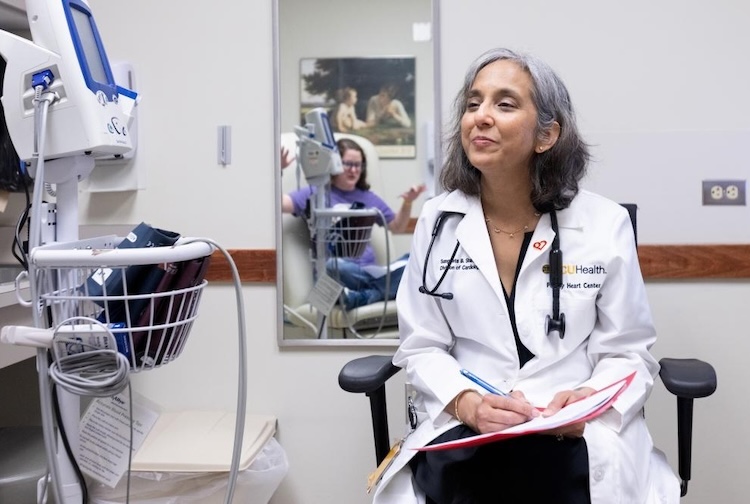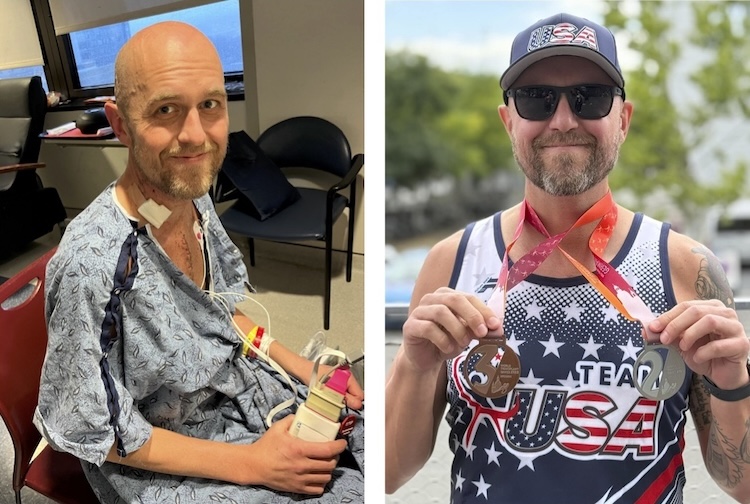Research lab addresses cardiovascular health disparities in Black communities
Personal connection propels Anika L. Hines, Ph.D., to lead Equity in Cardiovascular Health Outcomes Lab.
March 10, 2022 For Anika Hines, Ph.D., the drive to learn more about cardiovascular health risks and outcomes for Black women and her community stems from personal experience and has led to a desire to work with policymakers to establish a framework for addressing environmental stressors and improving health outcomes. (Photo: DeAudrea 'Sha' Aguado, VCU School of Medicine)
For Anika Hines, Ph.D., the drive to learn more about cardiovascular health risks and outcomes for Black women and her community stems from personal experience and has led to a desire to work with policymakers to establish a framework for addressing environmental stressors and improving health outcomes. (Photo: DeAudrea 'Sha' Aguado, VCU School of Medicine)
By Laura Ingles
Anika L. Hines, Ph.D., was a pensive, perceptive child. Growing up in one of the only Black households on her block in suburban Norfolk, Virginia, she wondered if anyone else noticed the inequities around her, especially when it came to health. Before ever hearing the phrase “health disparities,” she watched them play out in her own life.
“From a pretty young age I made observations about the fact that African Americans lived shorter, sicker lives. At least, that was the case due to premature death and illness in my family,” Hines said. “I wondered if other people saw things the way that I did, but I didn't know if it was a thing I should talk about.”
Now an assistant professor and researcher in the Department of Health Behavior and Policy at the Virginia Commonwealth University School of Medicine, Hines has built her career around seeking answers to those questions she began formulating as a child. With a master's in public health, a doctoral degree in health policy, years of industry research and a postdoctoral fellowship under her belt, Hines joined the faculty at VCU School of Medicine in 2018. She runs the Equity in Cardiovascular Health Outcomes Lab, where she and a cadre of students investigate how psychological stressors related to race and other social determinants of health affect cardiovascular health.
As a recipient of a Mentored Research Scientists Career Development Award from the National Heart, Lung and Blood Institute, Hines will soon launch a project to design novel interventions to mitigate cardiovascular risk among young Black women. Participants ages 18 to 39 will wear heart monitors for a two-week period, and Hines and her team will identify different types of stressors that cause a spike in heart rate. They will then use the data to develop an intervention that helps women manage acute stress and make lifestyle changes to manage chronic stress over time.
“My work focuses on the mind-body continuum and how experiences in our environments, not just personal but structural factors, affect our health behaviors and outcomes,” said Hines. “We look at socioecological frameworks, how individuals are situated in their families and in their communities and how they unfold to produce outcomes.”
Housing, hunger and heart attack
Sarah Collins, a registered dietitian, Ph.D. candidate in the Health Care Policy and Research doctoral program and one of Hines' mentees, is examining how housing situations and food insecurity connect to impact blood pressure, a key cardiovascular health outcome.
Cardiovascular disease and death following a heart attack are about three times more likely in individuals experiencing homelessness than in those with stable housing. Collins aims to bring these findings to local policymakers to establish a framework for addressing environmental stressors and improving health outcomes for this vulnerable population.
Mental health, stress and the cardiac connection
Collins joined the Equity in Cardiovascular Health Outcomes Lab because she admired Hines' approach to research, with “one foot in policy and the other in implementation,” and she quickly realized that her mentor is not only a dedicated educator and researcher, but a person of integrity who practices what she preaches.
“She takes her vacations,” Collins said. “There are a lot of professors who don't do that, but having a mentor you can actually see creating a healthy work-life balance is incredibly valuable.”
Alexandria Ashe, the assistant director of research integrity and ethics in the Office of the Vice President for Research and Innovation and a December 2021 graduate of VCU's Master of Public Health program, echoed that sentiment.
“She's truly passionate about what she does and about all of us taking care of ourselves,” Ashe said. “She's really open about when she needs to take time to de-stress, which gives us permission to learn how we can pause as well and take mental health breaks.”
Hines helped Ashe frame the central question for her M.P.H. capstone project, which examined the physiological impacts of microaggressions in Black women. Ashe used data from a survey of about 140 people ages 18 to 40 who self-identified as Black and female, asking questions about their mental health, physical health, feelings in the workplace and stress levels.
Data on affluent Black women a rarity
To her knowledge, it was Ashe's first time seeing a set of data representing affluent, successful Black women, whose environmental stressors did not include housing insecurity or financial issues. The results overwhelmingly revealed that these “highly supported, well-established individuals with high resiliency scores” still reported high stress levels, especially at work.
“For me as a Black woman, I thought, maybe if I get a degree, people will listen,” said Ashe, who has experienced feeling unheard and overlooked in the workplace. “What I saw in the survey is that education doesn't necessarily change that. It revealed that there is something more to explore about moving in the world as a Black woman, and how subtle interpersonal interactions can impact health and well-being.”
Before Ashe joined the lab, she said she didn't realize the question of microaggressions was one that needed to be asked. But it immediately resonated with her because, as she has learned in academia, “people are interested in what they do because they connect to it.”
That couldn't be truer for Hines.
Personal loss reflects statistics
The tragic loss of her brother, who was only 25 when he died unexpectedly, led Hines down the path of public health, studying communities and structural systems to address health disparities. Since her brother's death, Hines has also lost her father to cardiovascular health issues. She attributes his death to the heartbreak and psychological stress of losing his son, which led to his physical deterioration and her mother to a heart attack.
“My family was a so-called 'good family' in many ways. We went to school, we had enough money, we went on vacations, we played together. We had all the right ingredients to live a long life, and I've spent my entire career trying to understand this field better,” Hines said. “Thankfully I have a younger brother with whom I'm really close. But my central, core family is 60% gone.”
As Hines pulls at threads to slowly unravel the tangle of social determinants and health inequities, she continues to see herself and her entire family in the statistics she uncovers and the policies she aims to improve. And that's both a burden and a privilege.
“There's a certain level of stress and necessary self-care when dealing with these issues that so closely affect you,” said Hines. “There's a balance I have to achieve, between the burden of being someone who's part of the marginalized group experiencing these outcomes, and also the privilege of being in a space where I can use the platform that I have to make the voices of people without as many resources heard.”




